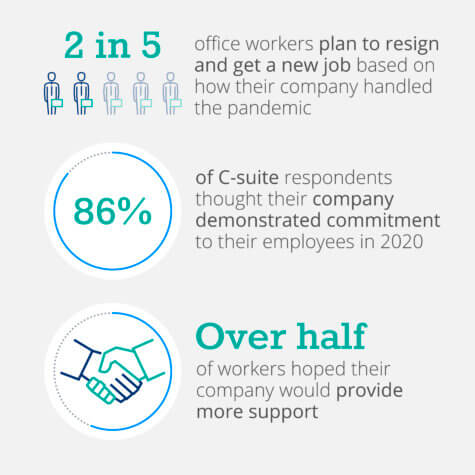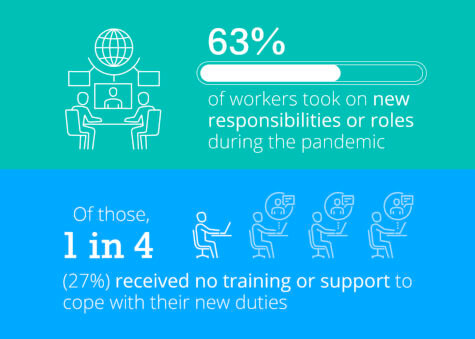NEW YORK — While many people are just happy to turn the page on 2020, a new survey finds some are still holding a grudge against their employers. Two in five office workers plan to resign and take a new job as soon as they can because of their company’s response to the coronavirus pandemic.
The OnePoll study, commissioned by SilkRoad Techonology, examined differing perceptions between 1,500 office workers (many of whom are now working remotely) and 500 C-suite level executives about their company’s COVID-19 planning.
Eighty-six percent of C-suite respondents think their organization demonstrated a commitment to their employees during the pandemic. Unfortunately for them, one-third (35%) of office workers say they don’t agree with that message and don’t feel valued as an employee. In fact, over half of workers admitted they had hoped their company would offer more support to employees in their initial pandemic response.
So how did workers think their company could have improved their response to the pandemic? Better technology provisioning for the transition to working from home came in as the top response in the poll. Clearer policies and more communication between departments round out the top three desired improvements.
Remote employees working without support

The pandemic continued to bring surprises for workers as they adjusted to working remotely. Out of the 63 percent who took on additional responsibilities during this period, one in four (27%) said they received no training or support. Another 25 percent only received “some” training while in quarantine.
While the transition to working from home proved challenging for most, one in five workers started a new job during the pandemic; creating even more hurdles. Over half of new employees (52%) felt like they didn’t receive enough training to perform effectively. Another 56 percent still have unanswered questions about their new jobs. One in two people (52%) confessed that they have struggled to form personal relationships with their coworkers as well.
“This survey has confirmed and even emphasized what we were hearing from enterprises around the urgent need for adopting digital business models to help them compete in our new world,” says Robert Dvorak, President and CEO of SilkRoad Technology, in a statement. “Successful digital operating models emerging in 2021 will be centered on people and delivering an exemplary employee experience. Workforce transformation and change management are integral to planning and designing digital operating models, but are often overlooked, contributing to recent high failure rates (per BCG research).”
A failure to communicate?

The survey also finds COVID has noticeably impacted how respondents connect to their companies. One in three C-suite respondents said they have felt “much better” about their connection to their company than they did prior to the pandemic. Workers, however, did not share that enthusiastic sentiment. Over four in 10 office employees (42%) felt “about the same.” Another 23 percent felt that their connection to their company had actually worsened.
When asked how they’d like to see their company increase communication and connectivity, the two groups had differing opinions on how best to achieve that goal. Workers say the best way to increase communication is through regular meetings with their direct manager (23%). Meanwhile, C-suite respondents think the solution is regular meetings between them and employees (26%). On the bright side, both groups feel regular meetings with internal teams and departments would also be a help.
“Either way you look at it, increased communication is needed,” Lilith Christiansen, Chief Strategy and Product Officer at SilkRoad Technology adds. “Most people aren’t as comfortable with making a surprise phone call as they are with simply stopping by a colleague’s workspace. Therefore, it requires more planning and structured conversations to achieve the same level of collaboration and connectedness. Leaders and managers should leverage technology to organize and conduct these conversations to yield better results and improve the employee experience.”
